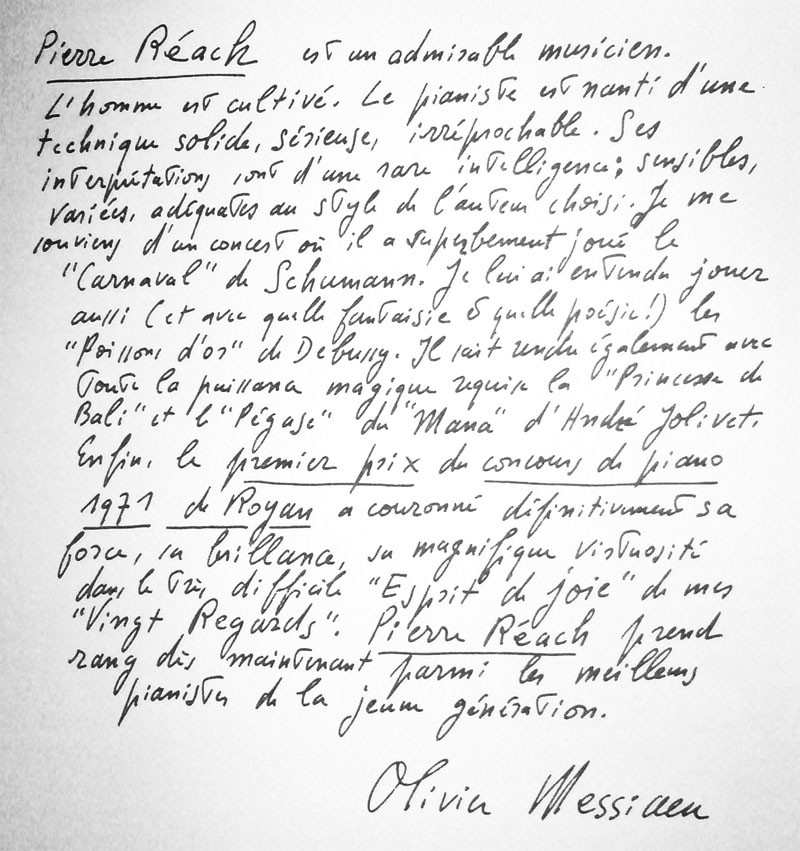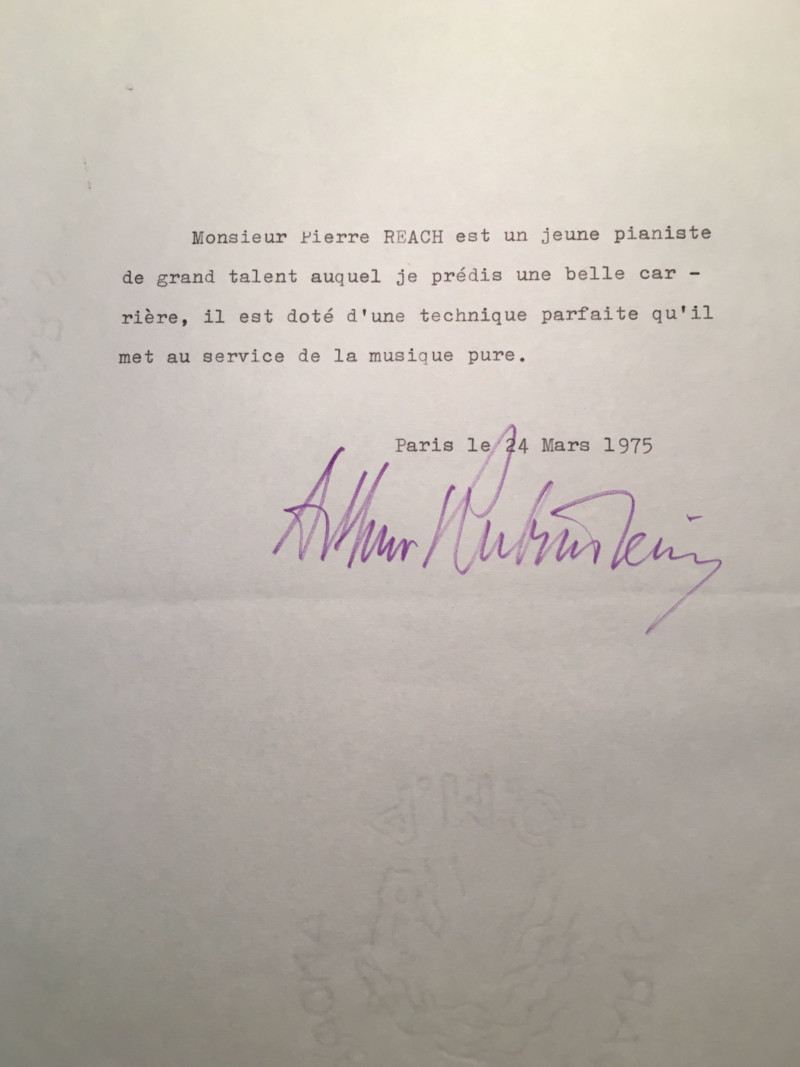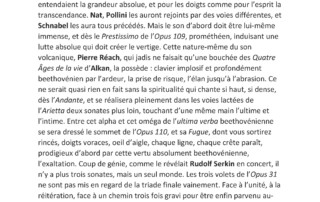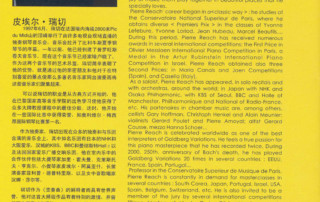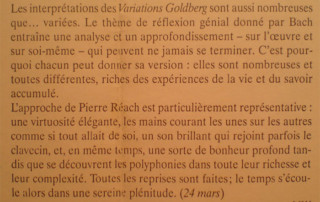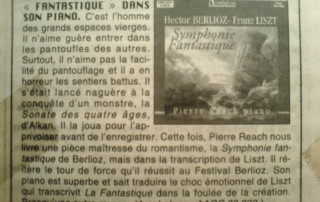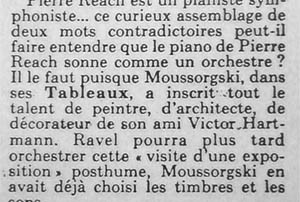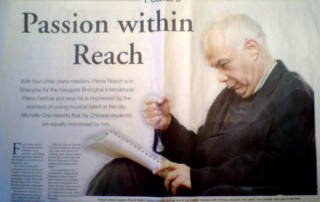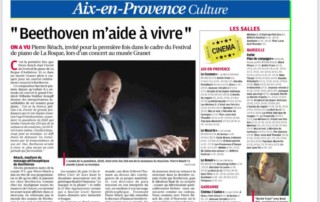Réflexions d’un pianiste confiné
Par Pierre Réach.
Ce texte sera publié en juillet 2021 dans la revue Française de Psychosomatique.
Texte ci après (cliquez sur la version concernée)
Réflexions
Reflections
期间的反思
Témoignages
Tri-C Classical Piano Series:
Pierre Réach at CMA (Feb. 9)
by Nicholas Stevens
Musicians love a good metaphor: take, for instance, that of summiting a mountain. When a violinist speaks this way after playing all of Bach’s partitas, or a soprano recalls preparations for a Wagner opera, the image of the artist mounting some hostile peak offers implications of persistence, struggle, and of course triumph. Pianists might describe Beethoven’s sonatas this way. But how many have actually played at the top of a mountain?
Archival video confirms that French pianist Pierre Réach literalized this image of the soloist at the summit over twenty years ago. A recent concert in Cleveland confirmed that the figurative Everest of Beethoven’s piano music still bears his banner as well.
Cuyahoga Community College presented Réach in an all-Beethoven program on Sunday, February 9, as part of its Classical Piano Series. The Cleveland Museum of Art’s Gartner Auditorium may not have offered a Pyrenees vista, but it was warmer, acoustically as well as literally.
The afternoon began with the dapper Réach striding out, smiling, and launching straight into the passionate opening bars of Beethoven’s Sonata in A-flat, Op. 26. Letting the inner voices sing, he translated the composer’s signature ardor into clean attacks and yearning phrases. The bass register, miraculously clear, emerged as a distinguishing strength early, and remained so throughout the left-hand-punishing program. At one point, Réach intentionally let a high phrase obscure the melody — a storm on the mountainside.
In this sonata’s scherzo, syncopations tear at the fabric of time. Réach made the slashing palpable. His take on the funereal third movement had darkness — but not the warm embrace of night. Its rhythms had a glinting coldness that presented the perfect contrast with a later, gentler passage. A master of efficient transition, Réach tumbled pell-mell into a finale so eager in its quest to resolve that some phrases slipped briefly, deliciously out of time.
Next came a reading of the Sonata No. 14 in c-sharp (“Moonlight”) that initially floated along at a quick clip — until the melody came in, and gravity pulled at the phrases.
Pedaling judiciously, Réach gave the impression of a crisp, bright evening rather than a foggy scene from Poe. Instead of letting the mood sink in, he pivoted without pause to the deliberately fluffy dance of the second movement. The third movement often becomes pianists’ excuse to show off right-hand dexterity, but Réach allowed the higher end of the keyboard to flow from the propulsive force of the lower.
Dizzy whirling and tense moments of expectation distinguished the performance of the first movement of the Sonata No. 15 in D (“Pastorale”) that opened the second half. Out of its suspenseful final note flowed the dark materials of the second movement, a moment of shadow amid sunshine elsewhere. Tension between animation and relaxation defined the third movement, and the fourth offered a preview of his approach to the ultimate finale of the concert.
Réach delivered the sort of sparkling performances that the audience had by then come to expect in the first and second movements of the Sonata No. 30 in E. However, it was in the third that he delivered the conclusion to his thesis on Beethoven’s piano music. In this pianist’s reading, the composer’s rhythms strain at their containers, and the forms accommodate the content only by force of will. A piano, a sequence of discrete sections, a grid of time, a human interpreter: each can try to contain Beethoven’s ideas, but they will show the stress of doing so. Fortunately, Réach — still poised and smiling in his tuxedo as he welcomed applause — has climbed this mountain often enough that he could now scale it without breaking a sweat.
Published on ClevelandClassical.com February 24, 2020.
Pierre Réach joue Beethoven comme on ne le fait plus : Avec amour et rage, des doigts qui saignent et un coeur plein de larmes.
Olivier Bellamy, Revue Classica Septembre 2019
Only a musician of intrepid character attempts Johann Sebastian Bach’s Goldberg Variations. The piano version of this summit of repertoire claims the requisite euphoria when a musician of bold and refined personality takes command. Reach is such a pianist. He played with fierce concentration and remarkable fluency… The tender episodes were set in fine contrast to the extroverted flourishes. Reach held the collection together like a master architect.
The Plain Dealer, Cleveland, Donald Rosenberg
This feat, mind-blowing for its concentration alone, allowed the set to take on an unusual personality.
Jeffrey Johnson, Yale, The Courant
Sans doute Pierre Réach est né avec un clavier dans son berceau. Il l’a encore fait sentir à son public dimanche soir lors d’une interprétation fabuleuse des Variations Goldberg. Plus qu’une interprétation il a livré une véritable incarnation de cette œuvre.
L’Est Républicain, Août 2007
Préparer l’écoute de la magistrale Sonate opus 106 par les six brèves Bagatelles opus 126 de Beethoven témoigne déjà de l’intelligence et de la rigueur de l’interprète. Avec une fabuleuse maîtrise de l’instrument, clarté absolue de l’articulation, lumière et vitalité du discours, sens architectural, Pierre Réach construit savamment l’édifice devenu légendaire. Une interprétation de référence.
Philippe Andriot, Le Tout Lyon
Une place de choix parmi les artistes de sa génération.
Gérard Condé, Le Monde
Rien qui ne soit mûrement réfléchi et parfaitement maîtrisé.
Jacques Doucelin, Le Figaro, Récital au Théâtre des Champs Elysées
Variations Goldberg, Salle Gaveau : L’approche de Pierre Réach est particulièrement représentative. Une virtuosité élégante, les mains courant les unes sur les autres comme si tout allait de soi, un son brillant qui rejoint parfois le clavecin, et, en même temps, une sorte de bonheur profond tandis que se découvrent les polyphonies dans toute leur richesse et leur complexité. Toutes les reprises sont faites ; le temps s’écoule alors dans une sereine plénitude.
Michele Worms, La Lettre du Musicien
Pierre Réach met la « Fantastique » dans son piano. Il réitère le tour de force qu’il réussit au festival Berlioz. Son piano est superbe et sait traduire le choc émotionnel de Liszt qui transcrivit la Fantastique dans la foulée de la création. Presque une autre œuvre.
Jacques Doucelin, Le Figaro
Pierre Réach, sculpteur de sons. Un des pianistes français à suivre les yeux fermés. Mais les oreilles bien ouvertes !
Antoine Livio, Le Quotidien de Paris
This was first rate music making.
The New York Times
Richmond Symphony-goers discovered a world class pianist last night.
The Richmond News Leader
Mit Petrouschka Sätzen in der Klavierfassung zeigte Réach, dass er auch virtuosere Register mit einem Understatement beherrscht, das schon fast unheimlich wirkt.
Basler National Zeitung
Une élévation de pensée que l’on rencontre rarement. Une liberté confondante et une assise technique surprenante dans « Regard de l’Esprit de Joie » de Messiaen.
Le Courrier Suisse
Merveilleux soliste du 2ème concerto de Saint-Saens, il a restitué cette œuvre dans sa vraie dimension et sa forte puissance émotive.On peut même affirmer qu’il a vraiment révélé cette œuvre passionnante avec une chaleur et une sensibilité merveilleuses.
Ouest France
Reach is a pianist to look out for. His technique is flawless and his interpretation of the much-played Grieg Concerto was always sensitive and wonderfully assured. He received an enthusiastic ovation from the large audience.
Manchester Evening News.
All the best Mozartian qualities were present in Pierre Reach’s playing of the K271 piano Concerto, a performance that once it got going combined grace, imagination, rafinement and fluidity of execution.
The Daily News.
Festival Liszt: divino Reach.
Sambenedett Oggi
Mit Petrouschka Sätzen in der Klavierfassung zeigte Réach, dass er auch virtuosere Register mit einem Understatement beherrscht, das schon fast unheimlich wirkt.
Basler National Zeitung
Pierre Réach est l’un de nos meilleurs musiciens. Il le rappelle ici avec une version aussi intelligente et rigoureuse que sensible des Variations Goldberg, une épreuve de vérité pour tous les pianistes.
Gérard Mannoni
Lliçó magistral a S’Agaró
Pierre Réach és d’aquells pianistes que no et deixen escapatòria. El seu discurs és tan punyent que no tens cap més remei que seguir-lo, i s’imposa des de la primera nota. Réach ja va fer una impressionant lectura de la Fantasia en do menor K.475 de Mozart, com si es tractés de la més ambiciosa de les sonates de Beethoven. Va ser la perla del programa, seguida sense interrupció, malgrat que el públic aplaudís per la Sonata en do menor K.457, que acostuma a acompanyar-la.
De tot el Carnaval el pianista en va fer una versió apassionada, sense respir.
El seu discurs és tan punyent que no tens cap més remei que seguir-lo, i s’imposa des de la primera nota… ens va oferir el fragment titulat Chopin de la manera més delicada i evocadora que mai hem sentit.
Jordi Maluquer
In his playing, Réach acknowledged all the quirkiness of the piece while bringing his impressive technical gifts to bear on its virtuosic gestures and his unerring musicianship to the expression of its dramatic and lyrical content.
Daniel Hathaway, Cleveland
By about seven minutes into this performance, I realized that I should have known of this man years ago…
Ivan Katz, Yale
Entretiens & Interviews
et autres liens
Entretien avec Edith Walter pour Radio Notre Dame.
3 Juin 2022
Entretien de Pierre Réach avec Bertrand Ferrier
Intégrale de cet interview fleuve en 13 épisodes.
28 mai 2022
Entretien de Pierre Réach avec Frédéric Hutman sur les sonates de Beethoven
14 mai 2022
Article par Joël Chevassus sur Beethoven – Sonates Opus 31, 109, 110, 111.
7 mai 2022
Entretien avec Stéphane Loison, blog Vieilles Carnes
15 avril 2022
Hommage de Pierre Réach à Jean Fassina
Interview réalisé à Paris en avril 2021
En images…
